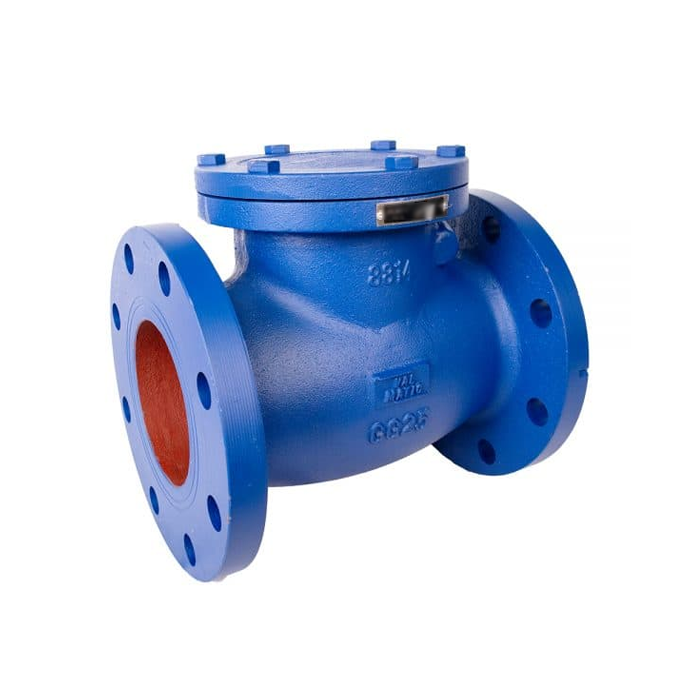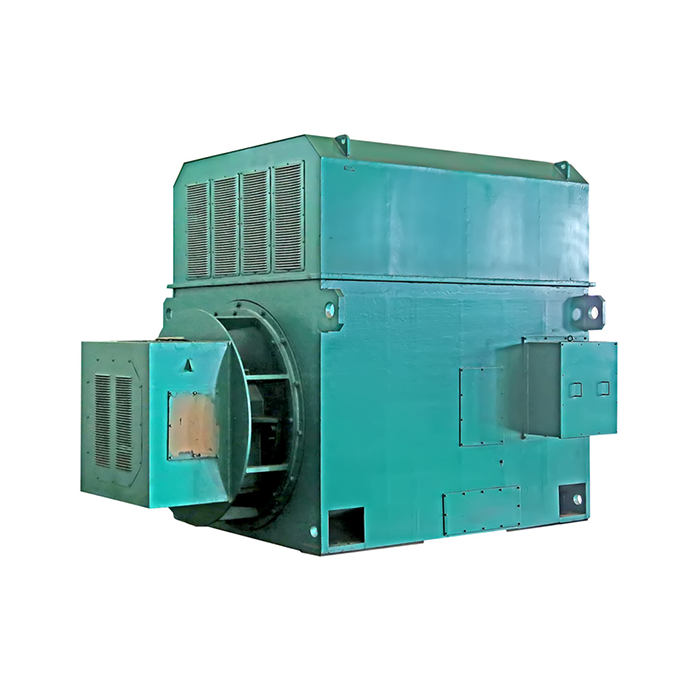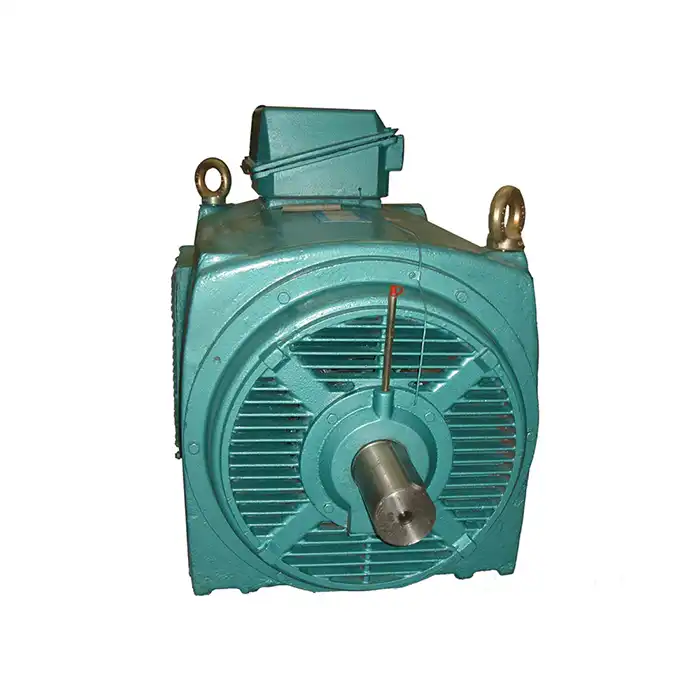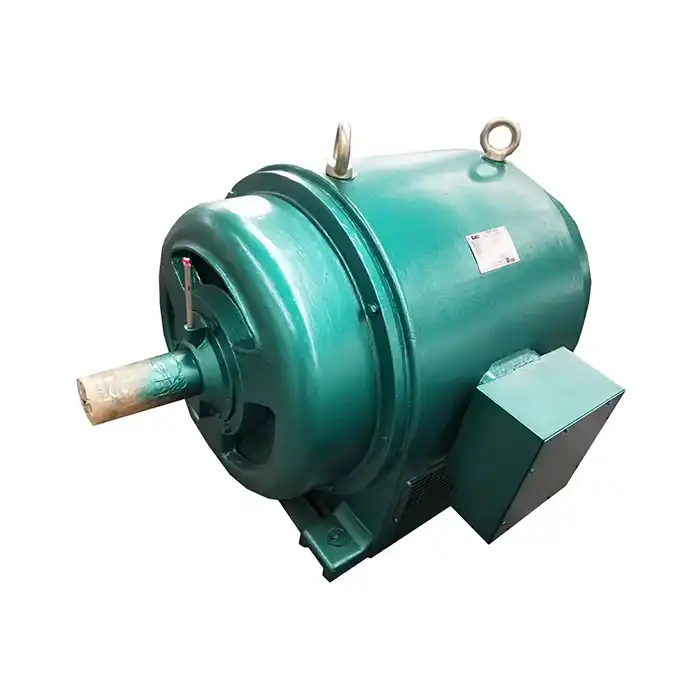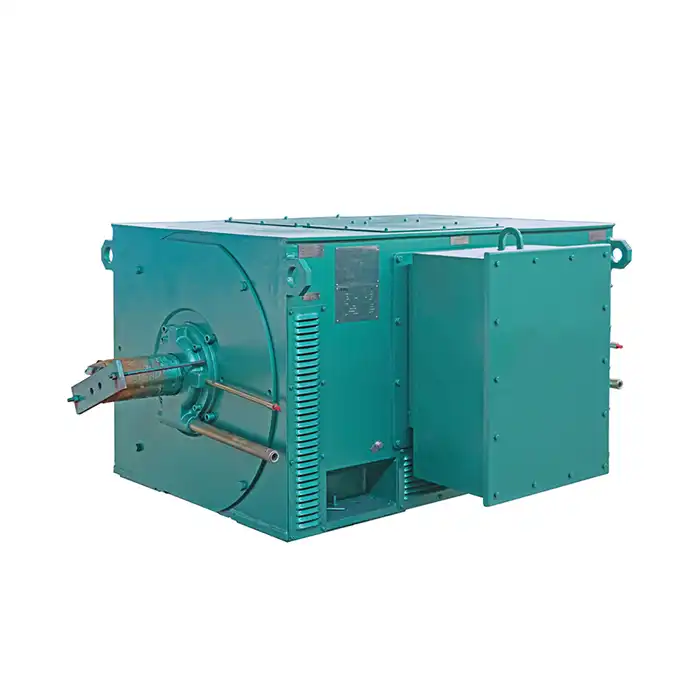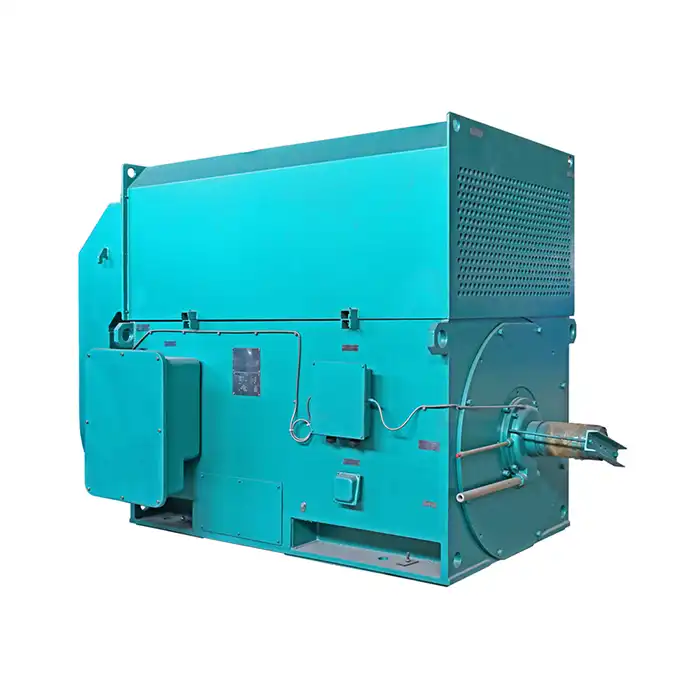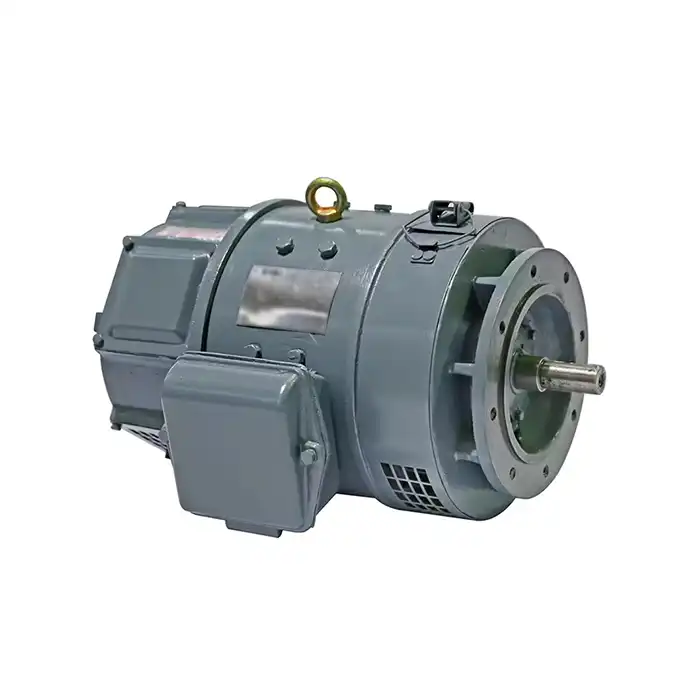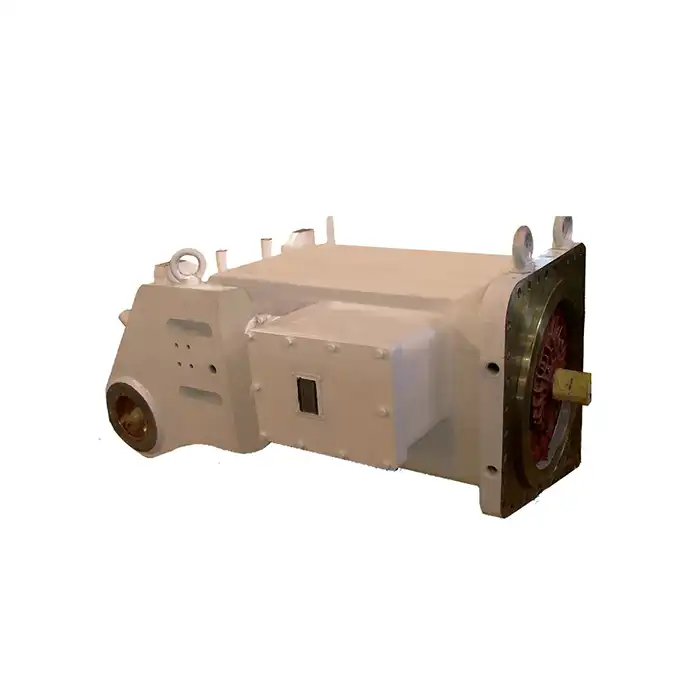200 HP AC Electric Motor for Pumps, Compressors & Crushers
When it comes to powering heavy-duty industrial equipment like pumps, compressors, and crushers, a 200 HP AC electric motor is often the go-to choice for many manufacturers and plant operators. These robust motors provide the necessary power and reliability to keep critical machinery running smoothly in demanding environments.

In this comprehensive guide, we'll examine the key factors to consider when selecting a 200 HP motor for various applications, explore the unique demands of crusher operations, and share valuable maintenance tips to extend the lifespan of your high-powered electric motors.
How to Select the Right 200 HP Motor for Your Compressor
Choosing the appropriate 200 HP AC electric motor for your compressor application requires careful consideration of several factors:
1. Understand Your Compressor's Power Requirements
Before selecting a motor, it's crucial to have a clear understanding of your compressor's power needs. Consider factors such as:
- Compressor type (reciprocating, rotary screw, centrifugal, etc.)
- Required pressure output
- Duty cycle
- Starting torque requirements
- Operating environment (temperature, humidity, altitude)
These factors will help determine whether a 200 HP motor is suitable for your specific compressor application.
2. Consider Motor Efficiency
Energy efficiency is a critical factor in motor selection, especially for high-power applications like 200 HP motors. Look for motors with high efficiency ratings, such as those meeting or exceeding IE3 (Premium Efficiency) standards. While these motors may have a higher initial cost, they can lead to significant energy savings over time, reducing your overall operating expenses.
3. Evaluate Speed and Torque Characteristics
Different compressor types have varying speed and torque requirements. For instance:
- Reciprocating compressors often require motors with high starting torque
- Rotary screw compressors typically operate at constant speeds and may benefit from motors with flat torque curves
- Centrifugal compressors might require variable speed operation, necessitating the use of a variable frequency drive (VFD) with the motor
Ensure that the 200 HP AC electric motor you choose can meet these specific speed and torque requirements for optimal compressor performance.
4. Assess Environmental Factors
Consider the environment in which the motor will operate. Factors to evaluate include:
- Ambient temperature
- Humidity levels
- Presence of corrosive substances
- Exposure to dust or other particulates
- Altitude (which can affect motor cooling and performance)
Choose a motor with appropriate enclosure types (e.g., TEFC for dusty environments) and insulation classes to ensure reliable operation in your specific conditions.
5. Compatibility with Existing Systems
Ensure that the selected motor is compatible with your existing electrical infrastructure, including:
- Voltage supply (e.g., 380V, 460V, 575V)
- Frequency (50Hz or 60Hz)
- Starting method (across-the-line, soft start, or VFD)
- Physical mounting requirements
Compatibility issues can lead to installation delays or suboptimal performance, so it's essential to verify these details before making a purchase.
6. Long-term Reliability and Support
When investing in a 200 HP AC electric motor, consider the manufacturer's reputation for quality and after-sales support. Look for motors with robust construction, quality components, and comprehensive warranties. Additionally, ensure that the manufacturer or supplier can provide technical support and spare parts availability for the expected lifespan of the motor.
Crusher Applications Demanding High-Horsepower AC Motors
Crushers play a vital role in various industries, including mining, quarrying, and recycling. These powerful machines require equally robust motors to drive their operations efficiently. Let's examine why 200 HP AC electric motors are often chosen for crusher applications and the specific demands they must meet.
1. Types of Crushers Using 200 HP Motors
Several types of crushers commonly utilize 200 HP AC electric motors:
- Jaw crushers
- Cone crushers
- Impact crushers
- Hammer mills
Each of these crusher types has unique power requirements and operating characteristics that the motor must accommodate.
2. High Starting Torque Requirements
Crushers often require significant starting torque to overcome the initial resistance of the material being crushed. A 200 HP AC electric motor for crusher applications should be capable of providing high starting torque, often 200% or more of the rated full-load torque. This ensures the crusher can start reliably under load, reducing wear on mechanical components and minimizing downtime.
3. Ability to Handle Shock Loads
Crusher operations can be unpredictable, with sudden variations in material size and hardness leading to shock loads on the motor. The selected motor must be robust enough to withstand these sudden torque spikes without damage. Features such as reinforced windings and heavy-duty bearings are essential for long-term reliability in crusher applications.
4. Dust and Debris Protection
Crushing operations generate significant amounts of dust and debris, which can be detrimental to motor performance and lifespan. When selecting a 200 HP AC electric motor for crusher applications, consider motors with high ingress protection ratings (e.g., IP55 or higher) and features such as:
- Totally enclosed fan-cooled (TEFC) designs
- Sealed bearings
- Robust shaft seals
These features help protect the motor's internal components from contamination, ensuring reliable operation in harsh crusher environments.
5. Cooling Considerations
Crusher applications often involve high ambient temperatures and continuous operation, placing significant thermal stress on the motor. Effective cooling is crucial to maintain motor performance and prevent premature failure. Consider motors with:
- Enhanced cooling fin designs
- High-efficiency fans
- Thermal protection devices
In some cases, external cooling systems may be necessary to maintain optimal motor temperatures in particularly demanding crusher applications.
6. Variable Speed Capabilities
Some crusher operations benefit from the ability to adjust crushing speed based on material characteristics or production requirements. In these cases, a 200 HP AC electric motor compatible with variable frequency drives (VFDs) may be advantageous. Ensure that the selected motor is inverter-duty rated if variable speed operation is required.
7. Energy Efficiency Considerations
Given the high power consumption of crusher operations, energy efficiency is a critical factor in motor selection. Look for motors with premium efficiency ratings (IE3 or higher) to minimize energy costs and reduce the environmental impact of your crushing operations.
Maintenance Tips for 200 HP Motors in Heavy-Duty Equipment
Proper maintenance is essential to ensure the longevity and reliability of 200 HP AC electric motors used in demanding applications such as pumps, compressors, and crushers. Here are some key maintenance tips to keep your high-powered motors running smoothly:
1. Regular Inspection and Cleaning
Perform visual inspections of your 200 HP motors on a regular basis, looking for signs of:
- Excessive dirt or dust accumulation
- Oil leaks
- Loose mounting bolts or connections
- Damaged insulation
- Unusual noises or vibrations
Clean the motor exterior regularly, paying particular attention to cooling fins and air intake areas. Use compressed air or a vacuum cleaner to remove dust and debris, being careful not to force contaminants into the motor's interior.
2. Lubrication Management
Proper lubrication is crucial for the longevity of bearings in 200 HP AC electric motors. Follow these guidelines:
- Adhere to the manufacturer's recommended lubrication schedule
- Use the specified type and grade of lubricant
- Avoid over-greasing, which can lead to overheating
- Monitor bearing temperatures and vibration levels to detect lubrication issues early
For motors with sealed bearings, respect their expected lifespan and plan for replacement at appropriate intervals.
3. Electrical System Checks
Regular electrical system maintenance is essential for safe and efficient motor operation:
- Inspect and tighten all electrical connections periodically
- Test insulation resistance regularly to detect potential winding issues
- Monitor voltage imbalance across phases
- Check for signs of overheating in electrical components
Consider using infrared thermography to identify hot spots in electrical systems before they lead to failures.
4. Vibration Analysis
Implement a vibration monitoring program for your 200 HP AC electric motors. Regular vibration analysis can help detect issues such as:
- Bearing wear or damage
- Misalignment
- Unbalance
- Loose components
Early detection of these problems allows for timely intervention, preventing catastrophic failures and minimizing downtime.
5. Cooling System Maintenance
Proper cooling is critical for the longevity of high-power motors. Maintain the cooling system by:
- Cleaning or replacing air filters regularly
- Ensuring proper function of cooling fans
- Keeping cooling fins clean and unobstructed
- Monitoring motor temperature during operation
For water-cooled motors, maintain the cooling water system according to manufacturer recommendations.
6. Alignment Checks
Proper alignment between the motor and driven equipment is crucial for reducing wear and preventing premature failure. Perform alignment checks:
- After initial installation
- Following any maintenance that involves disconnecting the motor
- Periodically as part of preventive maintenance
Use precision alignment tools to ensure accurate shaft alignment, reducing stress on bearings and couplings.
7. Documentation and Trend Analysis
Maintain detailed records of all maintenance activities, inspections, and measurements related to your 200 HP AC electric motors. This documentation allows you to:
- Track performance trends over time
- Identify recurring issues
- Optimize maintenance schedules
- Make informed decisions about motor replacement or upgrades
Use this data to develop a predictive maintenance strategy, minimizing unexpected downtime and maximizing the lifespan of your high-power motors.
Conclusion
Selecting and maintaining the right 200 HP AC electric motor for your pump, compressor, or crusher application is crucial for ensuring optimal performance, energy efficiency, and long-term reliability. By carefully considering factors such as power requirements, environmental conditions, and specific application demands, you can choose a motor that will serve your needs effectively for years to come.
Regular maintenance, including thorough inspections, proper lubrication, and proactive monitoring of electrical and mechanical systems, is essential for maximizing the lifespan and performance of your high-power motors. By implementing a comprehensive maintenance strategy, you can minimize downtime, reduce operating costs, and ensure the continued productivity of your industrial equipment.
Are you looking for high-quality, energy-efficient power equipment solutions for your industrial applications? Shaanxi Qihe Xicheng Electromechanical Equipment Co., Ltd. specializes in providing customers with power equipment that offers high energy efficiency, low energy consumption, and stable power output. Our expertise spans various industries, including manufacturing, process control, HVAC, energy and utilities, and more. Whether you need motors for pumps, compressors, crushers, or other heavy-duty applications, we have the knowledge and products to meet your specific requirements. Contact us today at xcmotors@163.com to discuss your power equipment needs and discover how we can help optimize your operations.
References
1. Johnson, R. (2021). High-Power AC Motors in Industrial Applications: A Comprehensive Guide. Industrial Motor Systems Quarterly, 45(2), 78-95.
2. Smith, A. & Brown, T. (2020). Energy Efficiency Considerations for Large Horsepower Motors. Energy Engineering Journal, 117(3), 32-48.
3. Lee, K. et al. (2019). Optimization of Motor Selection for Crusher Applications in Mining Industry. Mining Technology Review, 28(4), 215-230.
4. Rodriguez, M. (2022). Predictive Maintenance Strategies for High-Power Electric Motors. Maintenance Engineering International, 53(1), 12-28.
5. Thompson, E. (2020). Advancements in Cooling Technologies for Large AC Motors. IEEE Transactions on Industry Applications, 56(5), 4578-4589.
6. Wang, L. & Davis, R. (2021). Impact of Variable Frequency Drives on Motor Performance and Lifespan. Power Electronics in Industry, 39(2), 156-172.



